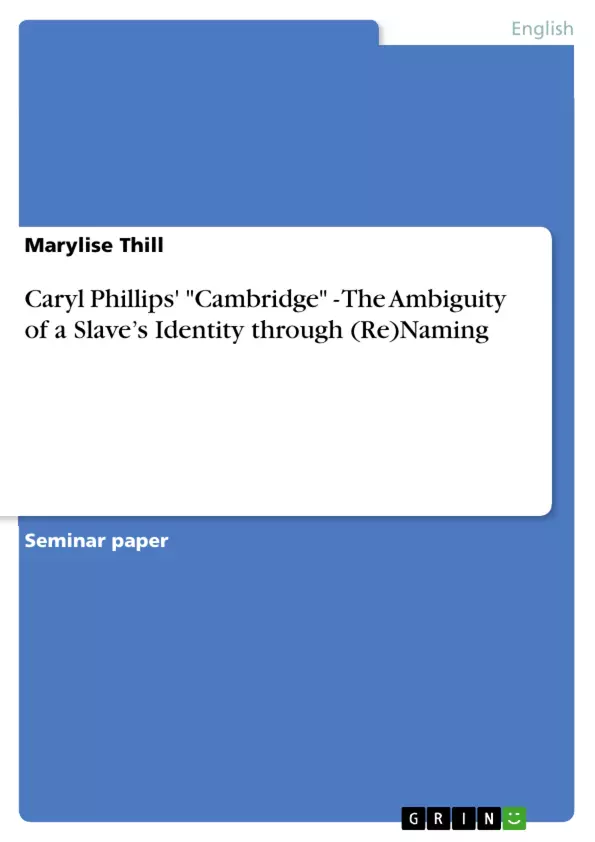In our postcolonial time, many novels have tackled and still tackle issues such as slavery, racism, belonging and identity. In this essay, we will mainly focus on one author that belongs to this wave, namely Caryl Phillips. He was born in St. Kitts, a Caribbean island, in 1958.1 He “came to Britain at the age of four months [...] and studied English Literature at Oxford University”.2 He is currently a well-known postcolonial writer whose works largely focus “on the legacy of the Atlantic slave trade and its consequences for the African Diaspora”.1 In this essay, we will analyze Phillips’ fourth novel, Cambridge3, which won the Sunday Times Young Writer of the Year Award.1 We will deal with the issue of the identity of the slaves, especially with regards to naming. In fact, slaves were always given a new name by their owners. Thus, we will analyze the impact of this naming on the slaves’ identity and the ambiguity to which it can lead. However, we will first provide a definition of the concept of “identity”. Then, we will go through how naming was applied in the history of the slaves and what was its significance. Finally, we will undertake an analysis of two characters of Cambridge and focus on their identity with regards to their different names. In addition, we will refer to another recent postcolonial novel, namely The Long Song4 by Andrea Levy.
Inhaltsverzeichnis (Table of Contents)
- The Ambiguity of a Slave's Identity through (Re)Naming, especially in Caryl Phillips' Cambridge
- Definition of Identity
- Naming Practices in the History of Slavery
- Analysis of Two Characters in Cambridge
Zielsetzung und Themenschwerpunkte (Objectives and Key Themes)
This essay analyzes Caryl Phillips' novel Cambridge, focusing on the theme of slave identity and how it is shaped by (re)naming practices. The essay aims to explore the ambiguity of a slave's identity as they are forced to adopt new names and shed their original cultural affiliations.
- The impact of forced renaming on a slave's identity
- The ambiguity of identity resulting from conflicting names and cultural backgrounds
- The role of language and cultural references in shaping identity
- The influence of colonization on the formation of identity
- The significance of Christianity in the construction of a new identity for slaves
Zusammenfassung der Kapitel (Chapter Summaries)
The essay begins by defining the concept of identity and explores the complexities involved in its construction. It then delves into the historical practice of renaming slaves during colonization, examining the reasons behind it and the impact on the slaves' sense of self. The essay explores the various naming practices used, including the use of diminutive forms, classical names, and names with geographical or commemorative significance. It also highlights the use of demeaning or satirical names, albeit less common.
Focusing on Cambridge, the essay analyzes the main character's journey through four different names: Olumide, Thomas, David Henderson, and Cambridge. It explores how each name reflects a stage in his identity formation and the influence of colonization on his sense of self. The essay highlights how the character's original name, Olumide, represents his lost identity, while "Thomas" marks a transitional period where he strives to adapt to English society. The essay concludes with the character's adoption of the name "David Henderson," signifying his embrace of Christianity and English identity.
Schlüsselwörter (Keywords)
This essay centers around the crucial concepts of slave identity, (re)naming, and the impact of colonialism. Key terms and concepts include: forced renaming, cultural assimilation, language and identity, Christian conversion, and postcolonial literature. The essay also analyzes specific works such as Caryl Phillips' Cambridge and Andrea Levy's The Long Song.
Frequently Asked Questions
What is the main theme of Caryl Phillips' "Cambridge"?
The novel explores the ambiguity of slave identity, specifically focusing on how forced renaming by owners impacts a slave's sense of self and cultural belonging.
How many names does the main character in "Cambridge" have?
The character goes through four different names: Olumide, Thomas, David Henderson, and finally Cambridge, each representing a stage in his identity formation.
What was the historical significance of renaming slaves?
Renaming was a tool of colonization used to strip slaves of their original identity and assimilate them into the culture or religion of their owners.
What role does Christianity play in the novel?
The protagonist adopts the name "David Henderson" as a sign of his embrace of Christianity and an attempt to form a new identity within English society.
Who is Caryl Phillips?
Caryl Phillips is a well-known postcolonial writer born in St. Kitts whose works often focus on the legacy of the Atlantic slave trade.
- Citar trabajo
- Marylise Thill (Autor), 2011, Caryl Phillips' "Cambridge" - The Ambiguity of a Slave’s Identity through (Re)Naming, Múnich, GRIN Verlag, https://www.grin.com/document/188030



